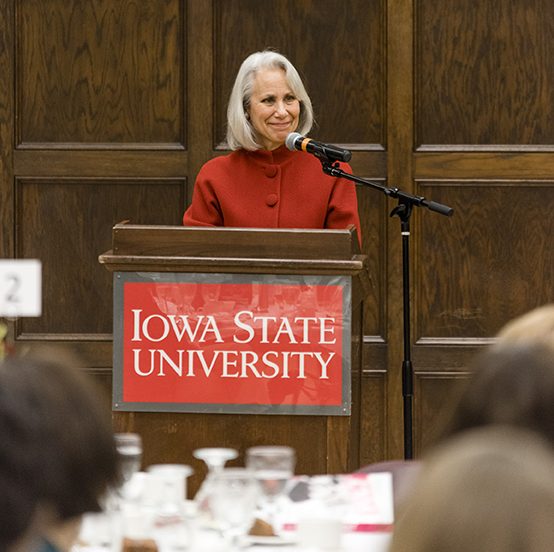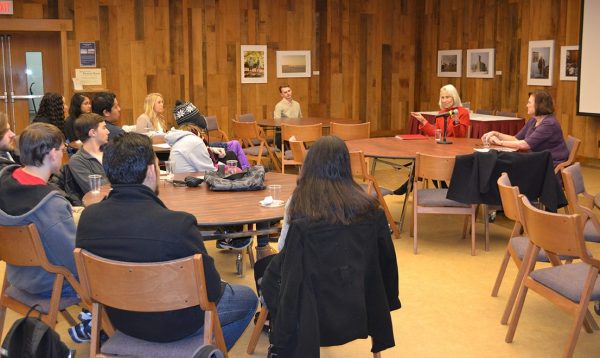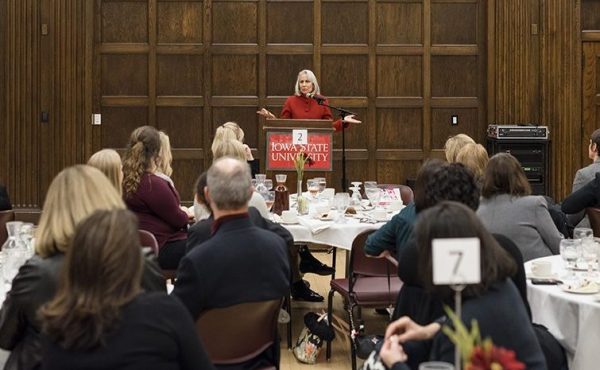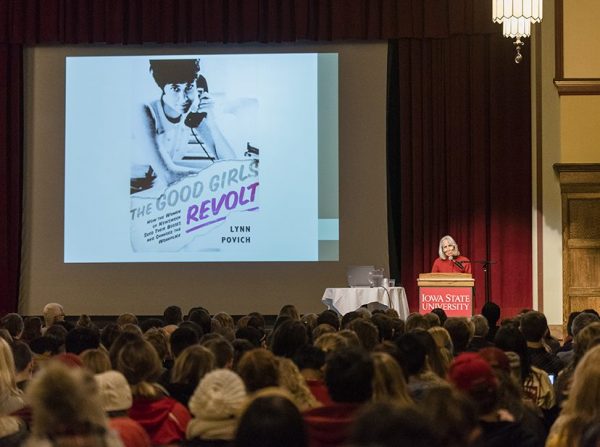
Lynn Povich presented “Good Girls Revolt: Women, Work and Politics” on Thursday, Dec. 1, as the fall 2016 Mary Louise Smith Chair in Women and Politics to some 650 Iowa State University students, faculty and staff and members of the Ames and the greater Des Moines area communities.
An award-winning journalist, Povich authored the book “The Good Girls Revolt: How the Women of Newsweek Sued Their Bosses and Changed the Workplace,” which describes the sexual discrimination lawsuit filed in 1970 by Povich and 45 other women working at Newsweek magazine. The book inspired a 10-episode docu-drama series, available on Amazon Prime. A trailer from the series is available here.
Povich decided to write her book, which she described as a “footnote to feminist history,” after realizing there were not a lot of books about women at work. During her lecture, she discussed the ripple effect the lawsuit had beyond the field of media and how it put all employers on notice about gender discrimination.
In her lecture, she posed the question: “Are we there yet?” After nearly 47 years since the original sexual discrimination lawsuit, Povich said women are still hitting a glass ceiling at around 20 percent of women in the corporate suite, which is similar to the percentage of women in Congress. Women make up only 4.8 percent of the Fortune 500 CEOs, 17 percent in the 200 largest law firms, 27 percent of federal and state judges, and 28 percent of full professors.

Lynn Povich meets with Iowa State students during a question-and-answer session before her public lecture on Dec. 1.
Povich went on to discuss what has and hasn’t changed for women in the workforce.
“Women currently struggle to find balance to be good workers, good bosses and good parents. It’s stressful, but I had the choice that my mother didn’t have,” she said.
Povich noted that second wave feminists had the civil rights movement that focused on inequality and the anti-war movement that questioned the authority on why we were in Vietnam as templates for protests and action. They had the women’s movement that challenged the assumptions about women’s roles in society that gave Povich’s generation a template for organizing and protesting together. Today, however, organization primarily takes place online
Povich also noted that second wave feminists thought technology would be liberating for women, but the opposite has proven true. “It has created the assumption that you’re expected to be available at all times,” she said. “Second wave feminists could get laws passed. But you can’t legislate attitude.”

Lynn Povich answers a question during a private dinner before her public lecture.
Povich discussed how these internalized cultural biases can box women into traditional roles or jobs, known as “glass walls,” and noted that modern feminists place more emphasis on the intersectionalities between race, class, ethnicity, sexual orientation and gender identity. “It’s a more inclusive way of talking about feminism,” she said.
In addressing the inclusivity of modern movements for equality, Povich said that labeling issues as “women’s issues” is a problem. For example, referring to leave from work to take care of children as maternity leave or paternity leave penalizes men and stifles women by inferring that they need more work-life balance and flexibility in the workplace. And, when a women works overtime, people wonder what type of mother she is.
“Men need to be part of the change,” Povich said. “These are not women’s issues, they are societal issues. They affect men too. Men have a big stake in this system.”

Some 650 people attended Lynn Povich’s public lecture on Dec. 1.
Following the lecture, Povich addressed questions from the audience and attended a public reception, where she signed copies of her book. Her visit to Iowa State was sponsored by the Carrie Chapman Catt Center for Women and Politics and the Committee on Lectures, which is funded by the ISU Student Government. Povich was introduced by Taylor Finn, an Elizabeth Hoffman and Brian R. Binger Legacy of Heroines scholar affiliated with the Catt Center and a graduating senior majoring in economics and Spanish.
Also as part of her visit to Iowa State, Povich participated in a question-and-answer session with students from the Catt Center, Greenlee School of Journalism and Communication, Leadership Studies Program and Committee on Lectures. She also was honored at a private reception and dinner attended by ISU administrators, faculty, staff and students and members of the Ames and greater Des Moines area communities.